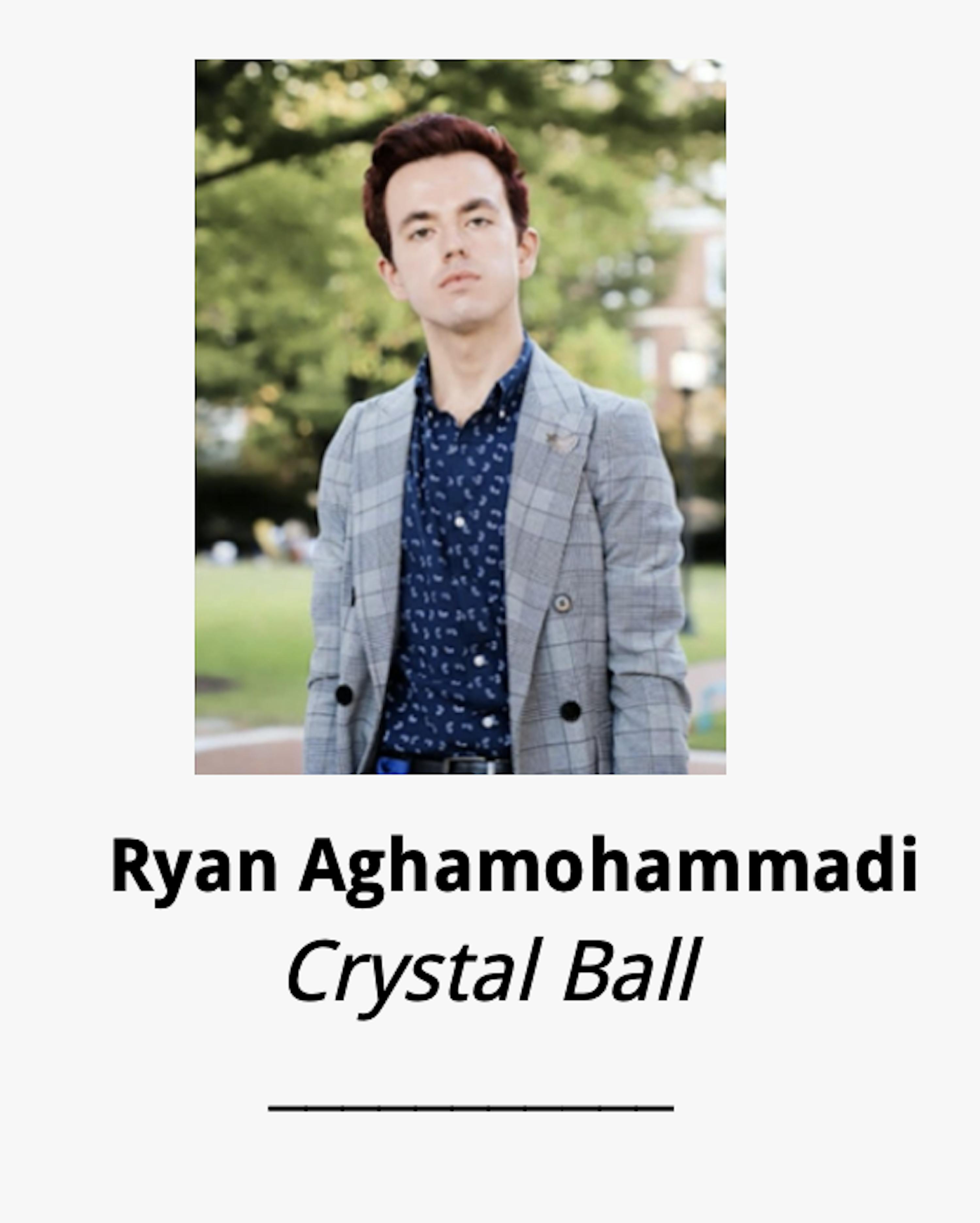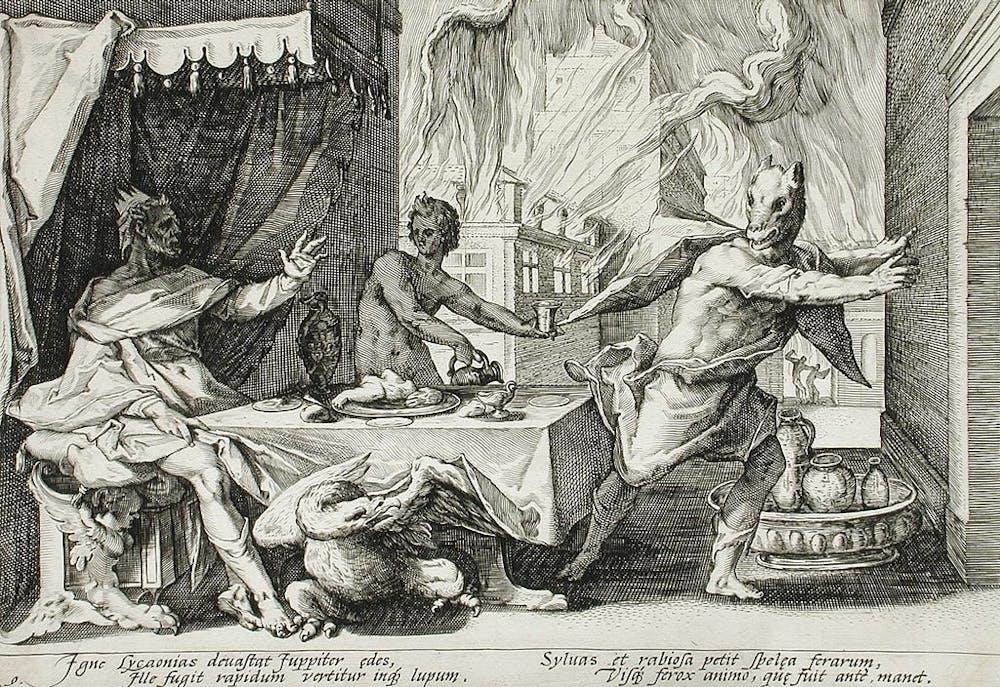
I can’t sleep. The humidity thickens the air, but the storm is long gone. My house is dark without power; only a few candles are lit here or there. The moonbeams drift in, shallow and blue, but the moon is so large it fills the window panes. These days, I am waiting for confirmation that I’m walking the right path.
In my eight days in the dark, I contemplated the forests that surround my home. I used to adventure in them when I was younger with my brothers. We’d traverse the bramble, the knots of green thorns, the behemoth roots lacing up the earth. We’d come across skittish deer, abandoned stone wells and tracks left in the mud by something much, much bigger than us. I thought about walking into the treeline the other day, but something stopped me.
I’m reading about werewolves in my spare time.
In one of the foundational myths, the Greek king Lycaon kills his son and serves his corpse to Zeus to test whether the god truly is omniscient. Zeus catches onto his trick and, as punishment, curses Lycaon to live the rest of his days as a wolf. In the witch trials of Europe, werewolf accusations ran parallel to accusations of witchcraft. In “Little Red Riding Hood,“ one of my favorite werewolf stories, the titular character wants to get to her grandmother’s house. The wolf wants to eat.
I’m fascinated by werewolves: the metamorphosis of one form to another, the temperance between human and wolf. In many stories, the wolf is a force of evil. It is a killer or worse. The hero must escape the forest. The hero must slay the wolf, or the wolf will devour the hero.
I wonder how much of the werewolf myth is based upon a fear of personal change. I undergo personal change so often that the fear seems foreign to me. I think I’ve grown numb to it, so this interpretation doesn’t resonate.
My friend texts me, “I think it’s about desire. I think it’s about being afraid of the things we want.”
I text back, “Please don’t say that,” but he’s already elsewhere.
What does it mean to want? To want too much? To be wanted? What does it mean to be known? What does it mean to want someone? What does it mean to want to be left alone?
I can count the things I want on one hand. In all fairness, they’re simple things, but I keep them locked between my lips like birthday wishes — part of me wonders that if I were to say them out loud, any flicker of a chance of them coming true would blow out. Or maybe that is the very reason they have not come to pass. I’m so worried about making a mistake; what if I want the wrong things? What if I don’t deserve them?
“Even if you make a mistake,” my father says, “make the mistake. Actually try to fail so you can learn to do better next time.”
But a mistake could get me devoured by the wolf or trapped in the forest endlessly searching for sanctuary. But isn’t that the irony of Little Red Riding Hood? She survives her way through the woods all by herself, evades the wolf and arrives at her grandmother’s house only to find him there. It’s inevitable.
Little Red Riding Hood exclaims, “What big teeth you have!”
The wolf replies, “All the better to eat you up with.” Then, the wolf devours her, or a woodsman saves her by killing the wolf. In a third version, she is the wolf; there is no stalking beast, there is no woodsman, there is nothing to face but oneself.
My best friend and I are watching a show about werewolves that incorporates the Jungian concept of the collective unconscious. To oversimplify, it’s the idea that there is a part of the unconscious mind everyone shares that derives from ancestral experience. In the show, the werewolf protagonist, while in a coma, must come to terms with all his mistakes and all his desires. Fittingly, the show depicts the collective unconscious as a forest. That’s it, then, we all share a forest. We all must face ourselves and each other.
In southern Utah there is a several thousand year old tree called the Pando that covers over 100 acres and is thought to be a single living organism. This single, ancient tree makes up an entire forest. It’s all connected, see? A tree becomes a forest. A human becomes a wolf. A want becomes a fear. My psychic tells me, “Remember that you’re going to die, go after what you want while you can.”
All I want to do is take each person I’ve ever met by the hands and face them down. I want to say, “You either respect me, or you don’t.” I want to say, “You either care about me, or you don’t.” I want to say, “You either love me, or you don’t. Choose.” I want to shout and scream and cry. I want I want I want.
I want to write something about transformation and boundaries. I want to write something about how sooner or later, we will have to face the things we want. I want to write about how the forest is also inside us, and perhaps that makes us trees.
I’m done feeling guilty of who I am and what I want. I am worthy of the things I desire. I am allowed to have edges. I stand in my own power and I honor myself. Do I need to turn around on the dirt path in the woods and battle the wolf for survival? I don’t think so. Maybe all it takes is to coax the wolf across the threshold of my home and set it in front of the fire to warm it from the cold.
Then, I’ll say to the wolf, “I have a red cape I use to nurture my wishes. I have a home here in the woods. I have strawberry jam and peanut brittle for when you get hungry. I have candles for you when it gets dark. And look, there’s the moon, the mother of wolves. She’ll protect us. I’ll protect you. I promise. Trust me. I’m sorry I was scared of you, you’re a part of me. I accept us unconditionally. We can have everything we want. I promise.”





